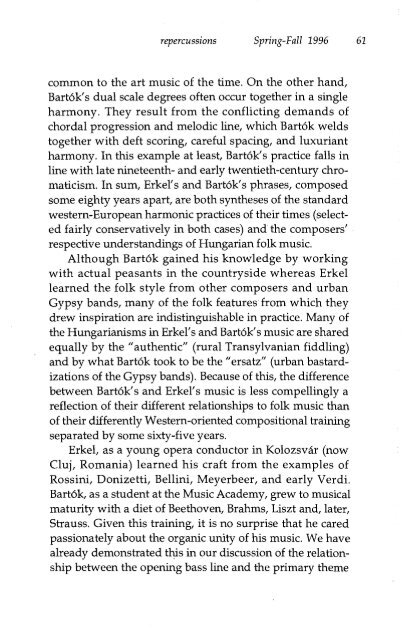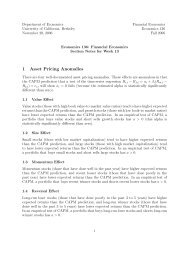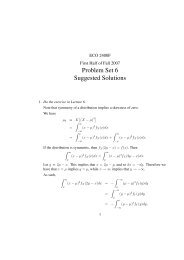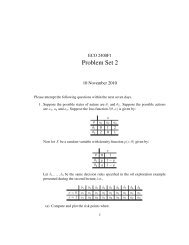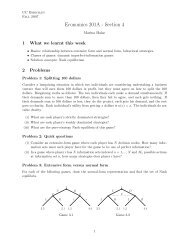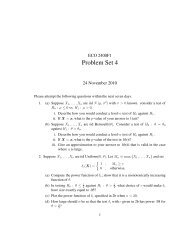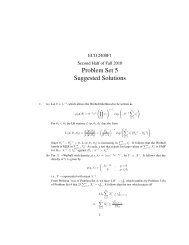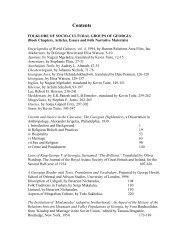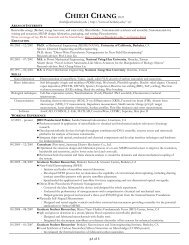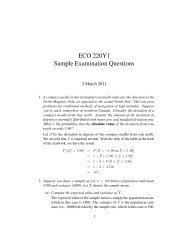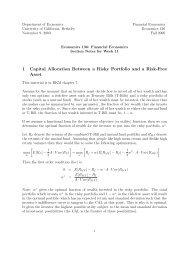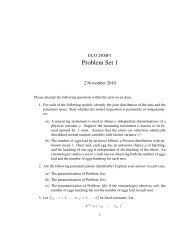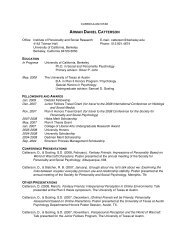A Context for Bela Bartok on the Eve of World War II: The Violin ...
A Context for Bela Bartok on the Eve of World War II: The Violin ...
A Context for Bela Bartok on the Eve of World War II: The Violin ...
You also want an ePaper? Increase the reach of your titles
YUMPU automatically turns print PDFs into web optimized ePapers that Google loves.
epercussi<strong>on</strong>s Spring-Fall 1996<br />
comm<strong>on</strong> to <strong>the</strong> art music <strong>of</strong> <strong>the</strong> time. On <strong>the</strong> o<strong>the</strong>r hand,<br />
Bart6k's dual scale degrees <strong>of</strong>ten occur toge<strong>the</strong>r in a single<br />
harm<strong>on</strong>y. <strong>The</strong>y result from <strong>the</strong> c<strong>on</strong>flicting demands <strong>of</strong><br />
chordal progressi<strong>on</strong> and melodic line, which Bart6k welds<br />
toge<strong>the</strong>r with deft scoring, careful spacing, and luxuriant<br />
harm<strong>on</strong>y. In this example at least, Bart6k's practice falls in<br />
line with late nineteenth- and early twentieth-century chromaticism.<br />
In sum, Erkel's and Bart6k's phrases, composed<br />
some eighty years apart, are both syn<strong>the</strong>ses <strong>of</strong> <strong>the</strong> standard<br />
western-European harm<strong>on</strong>ic practices <strong>of</strong> <strong>the</strong>ir times (selected<br />
fairly c<strong>on</strong>servatively in both cases) and <strong>the</strong> composers' .<br />
respective understandings <strong>of</strong> Hungarian folk music.<br />
Although Bart6k gained his knowledge by working<br />
with actual peasants in <strong>the</strong> countryside whereas Erkel<br />
learned <strong>the</strong> folk style from o<strong>the</strong>r composers and urban<br />
Gypsy bands, many <strong>of</strong> <strong>the</strong> folk features from which <strong>the</strong>y<br />
drew inspirati<strong>on</strong> are indistinguishable in practice. Many <strong>of</strong><br />
<strong>the</strong> Hungarianisms in Erkel's and Bart6k's music are shared<br />
equally by <strong>the</strong>" au<strong>the</strong>ntic" (rural Transylvanian fiddling)<br />
and by what Bart6k took to be <strong>the</strong>" ersatz" (urban bastardizati<strong>on</strong>s<br />
<strong>of</strong> <strong>the</strong> Gypsy bands). Because <strong>of</strong> this, <strong>the</strong> difference<br />
between Bart6k's and Erkel's music is less compellingly a<br />
reflecti<strong>on</strong> <strong>of</strong> <strong>the</strong>ir different relati<strong>on</strong>ships to folk music than<br />
<strong>of</strong> <strong>the</strong>ir differently Western-oriented compositi<strong>on</strong>al training<br />
separated by some sixty-five years.<br />
Erkel, as a young opera c<strong>on</strong>ductor in Kolozsvar (now<br />
Cluj, Romania) learned his craft from <strong>the</strong> examples <strong>of</strong><br />
Rossini, D<strong>on</strong>izetti, Bellini, Meyerbeer, and early Verdi.<br />
Bart6k, as a student at <strong>the</strong> Music Academy, grew to musical<br />
maturity with a diet <strong>of</strong> Beethoven, Brahms, Liszt and, later,<br />
Strauss. Given this training, it is no surprise that he cared<br />
passi<strong>on</strong>ately about <strong>the</strong> organic unity <strong>of</strong> his music. We have<br />
already dem<strong>on</strong>strated this in our discussi<strong>on</strong> <strong>of</strong> <strong>the</strong> relati<strong>on</strong>ship<br />
between <strong>the</strong> opening bass line and <strong>the</strong> primary <strong>the</strong>me<br />
61


